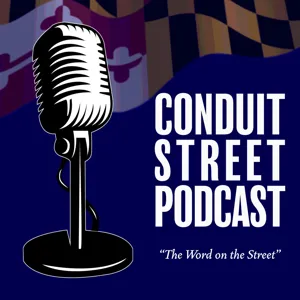Podcast Summary
Governors' roles shifted from spotlight to sidelines since 2008: In the last decade, governors' influence in American politics waned due to national issues and media environment changes, but the COVID-19 pandemic brought them back into the spotlight as critical leaders.
The role of governors in American politics has shifted significantly in the last decade, moving from the spotlight to the sidelines. From 1976 to 2008, governors were often seen as the most capable leaders in the country, with many going on to become President. However, starting with Barack Obama's presidency, this pattern was broken as American politics became increasingly nationalized and the media environment changed. Governors, who once had compelling narratives about getting things done at the state level, found it harder to compete on the national stage as issues like the Iraq war, financial crisis, and recession loomed larger. But the COVID-19 pandemic has changed this dynamic, with governors once again taking center stage as they lead their states through the crisis. Despite the nationalization of politics, the pandemic has shown that governors still have important roles to play in addressing critical issues facing their constituents.
Early US Governors' Actions to Contain Coronavirus: Governors led the way in implementing strict measures to contain the spread of coronavirus, despite having few confirmed cases, demonstrating the importance of state leadership during a national crisis.
During the early stages of the coronavirus crisis in the United States, state governors took the lead in implementing strict measures to contain the spread of the virus due to the lack of consistent federal leadership. Governors like Jay Inslee in Washington and Gavin Newsom in California were among the first to issue stay-at-home orders and ban large gatherings, even before their states had large outbreaks. The success of these measures relied on the community's understanding of the consequences of not following them and the interdependence of states. Governors from both Democratic and Republican parties, such as Mike DeWins in Ohio, also took aggressive actions to mitigate the spread of the virus despite having few confirmed cases at the time. The actions taken by these governors set an example for the rest of the country and showed the importance of state leadership during a national crisis.
Governors Leading the Way During Early Stages of COVID-19 Crisis: Governors like Andrew Cuomo took the lead during the early stages of the COVID-19 crisis, providing updates and reassurance to their states and the nation, but acknowledged they couldn't handle it alone and needed federal support.
During the early stages of the COVID-19 crisis in the United States, the absence of a clear message and leadership from the federal government left many governors, particularly Andrew Cuomo in New York, to step up and address their states and the nation. With the virus spreading rapidly, Cuomo, who had experience dealing with crises, was vocal about the threat and the specific resource needs of his state. The role of a governor in times of crisis became more prominent as Americans looked to their state leaders for updates and reassurance. However, despite their best efforts, these governors acknowledged that they couldn't tackle the crisis alone and needed significant federal support.
Different state responses to COVID-19 create confusion: The inconsistent approach to COVID-19 response between Democratic and Republican-led states has made it difficult to effectively contain the virus, with some governors expressing ideological opposition to lockdowns and others implementing them quickly.
The response to the COVID-19 pandemic has varied greatly from state to state, with Democratic-led, urban areas moving quickly to implement lockdowns, while Republican-led, rural states have been more reluctant. This inconsistent approach has created confusion and made it difficult to contain the spread of the virus effectively. For instance, Florida, governed by a Republican named Ron DeSantis, has been criticized for its slow response, despite being a hotspot for cases. Some governors, particularly in the South, have expressed ideological opposition to using their powers to halt business and commerce, and there seems to be a perception that the virus is an urban problem. However, it's clear that the virus affects rural areas as well. Ultimately, this lack of a uniform response has led to a messy situation and has made it more challenging to control the spread of the virus.
Presidential leadership shaping response for Republican governors: Republican governors in less densely populated states have been influenced by presidential leadership to take more aggressive actions to mitigate the spread of COVID-19
During the COVID-19 crisis, Republican governors who have been hesitant to take more aggressive actions to mitigate the spread of the virus, like Governor DeSantis in Florida, have looked to the White House for guidance. This is due to a combination of factors, including their established political power in their home states and the pressure they face from their constituencies and business communities. The turning point came when President Trump shared models predicting potential deaths from the virus, which shocked many holdout governors and led them to implement stricter measures. In essence, the crisis has highlighted the significant role of presidential leadership in shaping the response to the pandemic, particularly for Republican governors in less densely populated states.
Governors' actions and communication during COVID-19 impact public approval: Governors' handling of the COVID-19 crisis and their ability to effectively communicate with constituents will shape their political standing. The president's statements influence when states act, while governors provide comfort and reassurance.
The actions of governors during the COVID-19 pandemic and their ability to effectively communicate with their constituents will have significant consequences for their public approval. The president's statements have played a role in influencing when states decide to take action, with some governors waiting for clear direction before implementing restrictions. As the crisis continues, the focus on how governors handled the situation and the number of lives saved will be crucial for their political standing. Additionally, the president's role as a source of comfort and reassurance during times of crisis has been filled by governors, who have provided candid and emotional messages to their states about the long and difficult road ahead. The importance of practicing humanity and showing kindness and compassion during this challenging time cannot be overstated.
Millions of Americans and people worldwide file for unemployment benefits: The COVID-19 pandemic has caused massive job losses, with over 10 million Americans filing for unemployment benefits in the past two weeks and millions more globally uncertain about their future.
The COVID-19 pandemic continues to cause massive job losses across the world, with over 10 million Americans filing for unemployment benefits in the past two weeks alone. This figure includes 6.6 million new filings last week, which Speaker of the House Nancy Pelosi described as a stunning development. The economic impact is not limited to the US, with countries such as Britain, Austria, Norway, and Spain also experiencing significant increases in unemployment. To help combat the spread of the virus, the US is expected to advise all Americans to wear masks or face coverings when in public. This global phenomenon is a financial catastrophe, leaving millions of people without jobs and uncertain about their future. The Daily podcast team, which includes Theo Balcom, Andy Mills, Lisa Tobin, and many others, reported on these developments and the increasing global impact of the pandemic.



